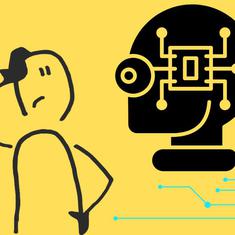On the 41st anniversary of Emergency – the proclamation of which President Fakhruddin Ali Ahmed signed on June 25 and the Union Cabinet ratified at 6 am on June 26 – the luminaries of the Sangh Parivar will recount stories of their heroic deeds in countering the authoritarianism of Indira Gandhi. They will tell us about their efforts to revive Indian democracy out of the 20-month coma into which she had despatched it into.
What they will certainly not do is to deny or confirm the rumours, as old as the Emergency itself, that many of their stalwarts, including former Prime Minister AB Vajpayee and Rashtriya Swayamsevak Sangh's sarsanghchalak Balasaheb Deoras, wrote fawning letters to Indira Gandhi, apologising for opposing her and offering cooperation. Over the years, however, the Emergency literature has grown to confirm some of these rumours, or at least have us doubt the scale at which the RSS and its affiliates claim to have to participated in resuscitating Indian democracy.
Among those who have questioned the Sangh Parivar’s role in the movement against the Emergency is none other than Subramanian Swamy, the Bharatiya Janata Party MP who is much in the news these days.
In a piece in the Hindu in 2000, Swamy wrote,
“It is on record in the Maharashtra Assembly proceedings that the then RSS chief, Balasaheb Deoras, wrote several apology letters to Indira Gandhi from inside the Yeravada jail in Pune disassociating the RSS from the JP-led movement and offering to work for the infamous 20-point programme. She did not reply to any of his letters.”
(Indira Gandhi’s 20-point programme was supposed to regenerate India, which the Congress would cite to justify the Emergency.)
When Swamy wrote the piece in the Hindu, Vajpayee was India’s Prime Minister, who too was accused of seeking to work out a truce with Indira Gandhi. Swamy claimed Vajpayee too had written apology letters (mark the use of plural) to Indira Gandhi, who deigned to oblige him.
How? Swamy provided the answer:
“In fact for most of the 20-month Emergency, Mr Vajpayee was out on parole after having given a written assurance that he would not participate in any programmes against the Government.”
In those days Swamy was still a long way from being rehabilitated in the BJP. He is also said to have nursed animus against Vajpayee. Given Swamy’s propensity to hurl unproven charges against his rivals – and the stature Vajpayee commanded post-Kargil – his accusation was ignored.
There is as yet no proof of Vajpayee having written apology letters to Mrs. Gandhi. But what we certainly know is that for much part of the Emergency, Vajpayee wasn’t in jail. He was either in hospital or convalescing at home on parole – but under house arrest.
This we now know through intrepid journalist Coomi Kapoor’s book, The Emergency: A Personal History, which was published last year. It is an account of how her extended family suffered during those dark 20 months. Her journalist-husband was arrested and her sister’s husband – Swamy himself – was chased as he crisscrossed the country in disguise. He, subsequently, winged his way to the United States, returned to India to memorably mock the Congress in the Rajya Sabha, and then left the country all over again. For writing the book, Kapoor interviewed Swamy.
Parole for Vajpayee
Vajpayee was arrested on the morning of June 26 in Bangalore. But within a few days he was admitted to the city’s Victoria Hospital, where he was operated for appendicitis. The prognosis had been wrong – Vajpayee was actually suffering from typhoid and, not surprisingly, septicaemia set in. His woes multiplied because a slipped-disc problem flared up.
Vajpayee was transferred to Delhi’s All India Institute of Medical Sciences, where he was assigned a room on the fifth floor and an operation on the slipped-disc was performed. He mostly lived in isolation. His foster-family had to go through a cumbersome procedure to meet Vajpayee, requiring them to make an application which would go all the way to the Prime Minister’s Office for clearance.
The isolation and hospital ambience must have been harrowing for Vajpayee who is known to have been fond of comfortable living. It could have made him write the apology letters that Swamy referred to in the Hindu piece. However, no letter of this kind has ever surfaced. Nor does Kapoor refer to any apology letters in her book.
But Kapoor does say that,
“eventually, because he was bedridden, Vajpayee was granted parole to stay at home. But his house on Ferozeshah Road was placed under constant surveillance.”
Among the other irritants Vajpayee and his foster-family had to countenance, according to Kapoor’s account, was that few came to meet them. The neighbourhood cabstand drivers were reluctant to take them around as they feared interrogation.
Kapoor quotes Vajpayee’s foster-daughter, Namita Bhattacharya, as saying, “We were treated as untouchables.” Namita’s remark seems a hyperbole, for when many Opposition leaders were in jail, Vajpayee’s stay at home for most of those 20 months – the time-span evident from a careful reading of Kapoor’s book – must have been a luxury for those times. He was certainly not the doughty gladiator who battled against authoritarianism.
Yet what seems a mystery is that Kapoor didn’t ask Swamy about the charges he levelled against Vajpayee 15 years before the book was published. It was presumably a slip-up. Or perhaps Swamy wasn’t willing to repeat the charge as he was back in the BJP. Or because Vajpayee was ailing, as he still continues to, it might have seemed impolite to even Swamy to do so.
Deoras's praise for Indira
Kapoor, however, passes a withering verdict on RSS boss Deoras. As she notes,
“Ironically, Balasaheb Deoras, who was put in jail, did not play such a heroic role (in contrast to RSS general secretary Madhavrao Mule and his deputy, Chaman Lal.) From prison he sent several letters to Indira Gandhi praising her leadership, and these were perceived as a form of apology and a plea for pardon.”
But what else could these letters have been other than worming his way to her? Adept at imparting spin to even the most egregious of their follies, the RSS has tried to project Deoras’ letters as a tactical manoeuvre to protect, as Kapoor says, “the interests of the organisation and its members.”
But Kapoor’s narrative shows the lurch towards a compromise with Indira Gandhi extended beyond a handful in the RSS. After important RSS leaders like Nanaji Deshmukh and Dattopant Thengadi were arrested, Kapoor says,
“the morale of the men fighting the Emergency underground was shattered. Many more turned ‘Twenty Pointers’ – paying obeisance to the Emergency powers, they declared their allegiance to Indira Gandhi’s Twenty Point Programme.”
Shades of grey
But this shouldn’t make us think that every RSS leader was prepared to surrender to Indira Gandhi. Neither Swamy nor Kapoor suggest this in their narratives. In fact, Swamy categorically noted,
“I must add that not all in the RSS were in a surrender mode. The exceptions were Madhavrao Muley, Dattopant Thengadi and Moropant Pingle.”
But, quite damagingly, he said he was asked by none other than RSS general secretary Mule to leave the country the second time. Swamy wrote in the Hindu,
“A tearful Muley told me in early November 1976 that I had better escape abroad again since the RSS had finalised the document of surrender to be signed in end January of 1977, and that on Mr Vajpayee’s insistence I would be sacrificed to appease an irate Indira…”
There is no corroborative evidence to back Swamy’s claim. Yet it is an interesting thought whether Swamy still subscribes to what he wrote in the Hindu. Perhaps someone should tweet to him asking that.
Nevertheless, it is amply clear that the Sangh’s role in countering the Emergency wasn’t as it is made out today. As eminent political scientist Professor DL Sheth, who is Honorary Senior Fellow of the Centre for the Study of Developing Societies, told Scroll in an interview last year,
“If you think how the Emergency was countered and resisted at several points, you won’t find many BJP characters. They were on the margins of politics.”
Kapoor claims that 25,000 RSS workers were detained and around 1,00,000 offered satyagraha. Since she doesn’t cite the source of her information, it can be presumed that these were RSS estimates. Assuming that the RSS did not inflate these numbers, one has to still take into account Sheth’s explanation for such high participation in the anti-Emergency movement:
“If you look at the number of people who were jailed during the Emergency, they (RSS) must be the highest. They had the cadres – and their families were looked after by the organisation. Once a person was in the jail, he didn’t face much problem there. It wasn’t as if they were being tortured.”
This was because the mechanism of oppression was decentralised. Torture and interrogation took place at police stations, not in jails. As Sheth, who toured different parts of the country during those 20 months and post-Emergency, said,
“Those who were tortured at police stations were the ones organising everyday protests. In comparison, spending two-three months or years in jail wasn’t that bad.”
In a tongue-in-cheek remark, he added,
“Somebody should write on their life there!” He was categorical that those who bore the brunt of the Emergency were “socialists and civil society activists, people who were dissenters.”
It does seem a travesty that apology-seeking Sangh leaders have projected themselves as the most spirited warriors against the Emergency. This projection is linked to their failure to convince the nation of having played a significant role in the freedom movement. VD Sarvarkar, who conceptualised the philosophy of Hindutva – which has been the Sangh’s lodestar - is no longer remembered outside RSS circles as a revolutionary, but as one who wrote craven letters of apologies to the British, offered to work with them in 1939, and inspired Nathuram Godse and his comrades to assassinate Mahatma Gandhi.
The anti-Emergency movement absolved the Sangh of their past sins. From the margins of Indian politics, it rode the Jayaprakash Narayan-led movement to its very centre. For the first time since the birth of the RSS in 1925, it was provided an event which it could celebrate and memorialise without anyone charging it of patently unethical conduct. The exaggeration of their real role in opposing the Emergency has continued to grow.
It has achieved this because the socialists either faded away or quarrelled and split apart or simply became caste leaders. This is why there is no pressure on the RSS to clarify who among its leaders offered to surrender to Indira Gandhi, nor a counter-narrative challenging its claims of having participated robustly, on a mammoth scale, in the movement which put Indian democracy back on the rails.
(Ajaz Ashraf is a journalist in Delhi. His novel, The Hour Before Dawn, has as its backdrop the demolition of the Babri Masjid. It is available in bookstores.)










